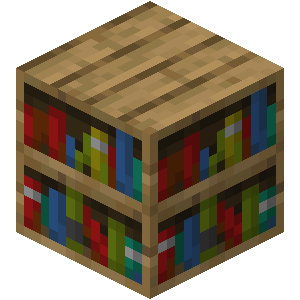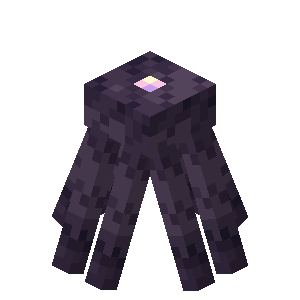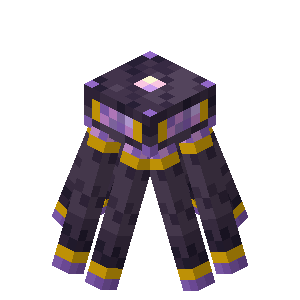A list of all the patterns I've discovered, as well as what they do.
I've discovered a curious pattern which scrambles an iota into an unreadable mess. However, unlike Garbage iotas, this mess still contains data, and running the same iota through the pattern will always produce the same mess (known as a hash). While it is not possible to recover an iota from a hash, it can be quite useful for comparisons in situations where I cannot save the unaltered iota.
Hashing Purification (any → hash)
Accepts any iota, and converts it into its hashed form.
I've found a couple patterns designed to interact with item frames. Nothing fancy, but they're nice utility for things like controlling my spell circles.
Additionally, it seems Sorter's Purification works on them just fine, so my attempts to find a dedicated frame-item pattern were pointless.
Decorator's Prfn. (item frame → number)
Accepts an item frame entity, and returns its rotation, from 0 to 7.
Decorator's Gambit (item frame, number →)
Accepts an item frame entity and an integer from 0 to 7, and sets its rotation to the number. Costs a negligible amount of media.
Scout's Exaltation ([type], vec, vec → entity | NULL)
As Scout's Distillation, but also accepts a list of entity type iotas. Any entity whose type is not present in the list will be ignored. Costs an amount of media slightly less negligible than that of the aforementioned pattern.
Entropy Reflection II (→ num)
Returns a random number with a gaussian distribution, with a mean of zero and a standard deviation of one.
Clearance Prfn. (vec → bool)
Accepts a vector, and returns whether that vector is within (or just on the edge of) the block in that space. Seems to involve the boxes I see in my mind's eye.
Flock's Rfln. II (→ num)
Returns the total size of all iotas on my stack, including the contents of lists and similar. If this number ever reaches 1024, my stack shall come crashing down into garbage.
Flock's Prfn. (→ num)
Accepts any iota, and returns its total size.
State Purification (vec → [string])
Accepts a vector, and returns a list of strings corresponding to values contained in the state of the block at the corresponding position.
State Distillation (vec, string → bool|num|vec|string)
Accepts a vector and a string, and uses the string as a key to retrieve the value it corresponds to in the target block's state, or null if there is no corresponding value.
Ride Wisp (wisp →)
Accepts one of my wisps (or a wandering wisp), and places me atop it, similar to sitting in a minecart. I must be within the wisp's ambit, or four blocks for wandering wisps. Costs one amethyst shard.
I should take care not to accelerate too quickly when riding a wisp, as unlike with Impulse, the acceleration is not applied evenly across my body, and can thus cause significant harm. The threshold for how quickly I can accelerate safely seems to be about 98 m/s over one second.
I should take care when mounting fast wisps, as the instantaneous velocity involved can contribute to this damage if I am too far from my final seated position.
Dismount
Takes me off of whatever entity I may be riding when cast. Costs 1/100 of a dust.
Equestrian Prfn. (entity → [entity])
Accepts an entity, and returns a list of entities seated atop it.
Equestrian Prfn. II (entity → entity)
Accepts an entity, and returns the entity it is seated atop.
These patterns work with a type of iota that represents lingering effects on a creature, which can allow me to asses the state of a creature more thoroughly than with only Nurse's Purification.
While my research suggests that status iotas representing instantaneous effects are possible, they would be very difficult to obtain, and I cannot think of any use case for them at the moment.
Apothecary's Prfn. (entity → [status])
Accepts a living entity, and returns a list of status iotas representing all effects on the target.
Apothecary's Prfn. II (status → num)
Accepts a status effect type, and returns a number based on whether the effect is likely to be helpful, harmful, or neutral to a creature.
Pharmacist's Dstln. (entity, status → num)
Accepts an entity and a status effect type, and returns the effect on the target's duration in seconds.
Pharmacist's Distillation II (entity, status → num)
Accepts an entity and a status effect type, and returns the effect on the target's potency.
Entity Distillation: Status (status, vector → entity | NULL)
Accepts a status effect type and a vector, and returns an entity at that position which has that effect.
Zone Exltn.: Status (status, vec, num → [entity])
Accepts a status effect type, a vector, and a number (n), and returns a list of entities within radius n of the vector which have that effect.
Zone Exltn.: Not-Status (status, vec, num → [entity])
Accepts a status effect type, a vector, and a number (n), and returns a list of entities within radius n of the vector which do not have that effect.
Ablation Purification (entity → num)
Accepts a living entity, and returns how much damage it can Absorb before its health is affected.
Cleanse Status (entity, status →)
Accepts an entity and a status effect type, and removes that status effect from the entity. Cost is based on the effect's innate harmfulness, its potency, and its remaining duration.
Costs more if attempting to remove a positive effect from an entity other than myself.
All of the patterns which deal with a specific status effect on an entity have the side effect that if the entity does not currently have the specified effect, the pattern will fail and inflict nausea upon me.
 Modified Slates
Modified Slates

 The Great Work
The Great Work Patterns
Patterns Iota Hashing
Iota Hashing Misc. Ephemera Patterns
Misc. Ephemera Patterns Status Iotas
Status Iotas Accumulator Manipulation
Accumulator Manipulation Spells
Spells Messaging
Messaging Particle Burst
Particle Burst Additional Flight Patterns
Additional Flight Patterns Link Amenities
Link Amenities






 Great Spells
Great Spells Instant Aegis
Instant Aegis Invisibility
Invisibility